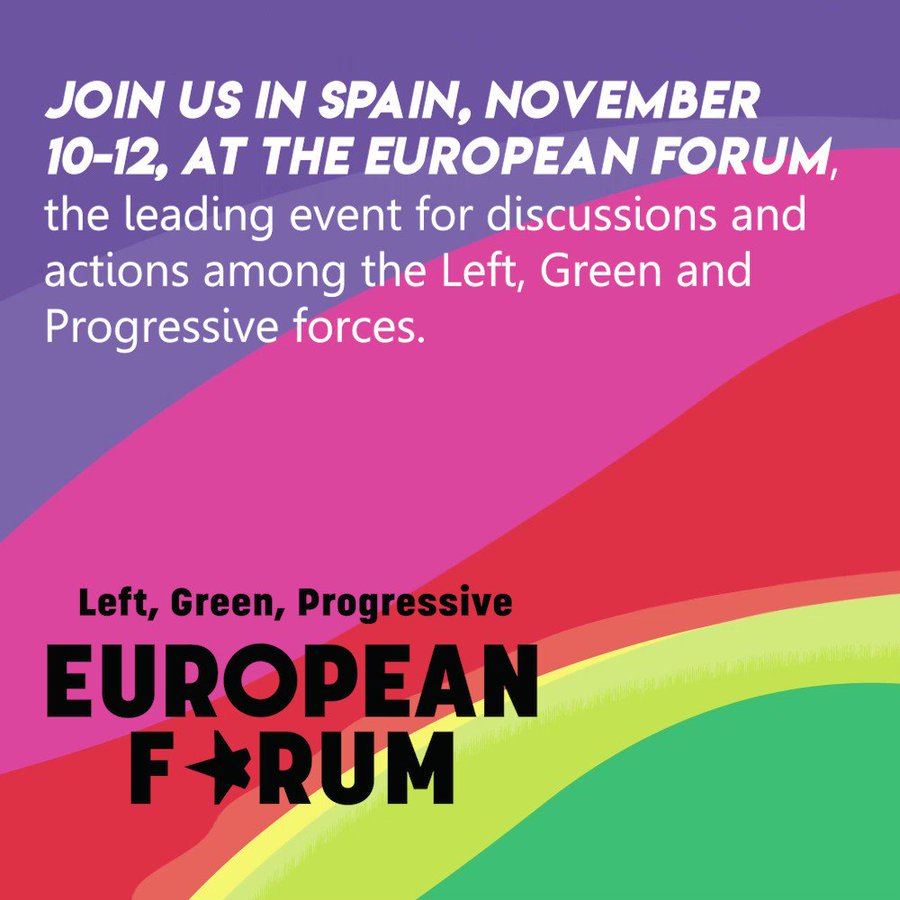
- This event has passed.
GEF at the European Forum (Madrid)

About the event
The European Forum is a unique space for the left, greens and progressives to come together. This event allows like-minded political foundations to organise debates and discussions on key social and green topics. Within this context and in collaboration with Transform! Europe and FEPS, GEF is organising two workshops on 11 November.
GEF’s role in the European Forum will draw from our Knowledge Community: the Future of the EU’s Energy Project and our work on Post- and Degrowth.
Programme
9:30-11:30 The Role of the State
Forging a socio-ecological welfare state defined by wellbeing within planetary boundaries could be the chance to face the polycrisis. Indeed, our welfare states should ensure universal access to high-quality essential services such as clean, affordable and energy-efficient housing and mobility, as well as strengthened social protection systems that mitigate the devastating consequences of climate change and environmental degradation. A new socio-ecological state would have a responsibility in enabling policy frameworks so citizens everywhere can take into their stride the new challenges brought about by digital breakthroughs and the climate crisis. By implementing social policies that tackle socio-economic inequalities, reduce our carbon emissions and limit our environmental impact, socio-ecological welfare states stand the chance to improve people’s quality of life and strengthen their resilience to shocks.
12:00-14:00 The Climate Dimension of the Future of the EU’s Energy Project
The current EU energy framework showed its weaknesses over the past couple of years – amidst crises. These uncovered problems with fossil fuel resource dependency, as well as with dependences on single countries as such. They showed the missing links between EU energy policy and security/geopolitics. The polycrisis also showed the lack of social safeguards and consideration in the EU and MS energy policy, it showed that the democracy dimension has been too much underlit, and above all – it clearly showed that, if the EU had doubled down on its clean energy transition a decade earlier, it would have been much more resilient to what it is experiencing today. Mitigating and adapting to climate change is in other words not solely extremely important in terms of avoiding climate damage and emergency, but also has positive spillover effects on energy security, and if done rightly on the social and democratic dimension of energy. So why isn’t it going faster? Panelists will be asked how to speed up the EU’s clean transition, zooming in as well on the existing stumbling blocks and cross-cutting policy areas.
Speakers
The Role of the State
- (Moderated by Kevin Le Merle, FEPS)
- Diego Lopez Garrido, Former Secretary of State for the European Union in the Spanish Ministry of Foreign Affairs and Cooperation
- Cornelia Hildebrandt, co-president Transform ! Europe
- Léa Das Neves Bicho, Political adviser to MEP Lamberts
- Ajda Pistotnik, Co-founder and Director, Policy Lab (Slovenia)
- Marta Iglesias Lopéz, International Action Director, Movimiento Por La Paz
The Climate Dimension of the Future of the EU’s Energy Project
- (Moderated by Taube Van Melkebeke, GEF)
- Davide Panzeri, ECCO, Italian think tank on climate change
- Eva García Sempere, Environmental activists, former MP and energy transition expert
- Kevin Le Merle, Analyst at the Foundation for European Progressive Studies, FEPS
- Sean Currie, Co-spokesperson Federation of Young European Greens
Practicalities
Date and Time: 11th November
Location: Madrid
Language: The main languages of the event will be English, Spanish and French.
You can read the full programme here. For more info, get in touch with Taube Van Melkebeke
This event is organised by the Green European Foundation with the support of with Transform! Europe , FEPS and with the financial support of the European Parliament to the Green European Foundation. The European Parliament is not responsible for the content of this event.
Details
- Date: 11 November 2023
-
Time:
9:30 am - 2:00 pm
- Event Category: Conference

